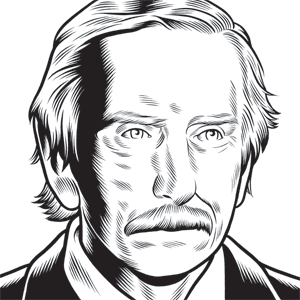Having a conversation with Edward Albee about theater, even if you’re relatively well versed in the subject, is a challenge on the level of trying to play chess with a grandmaster. It’s not just that he’s more knowledgeable about his own work than any interviewer could ever hope to be, but you get the sense that he’s always one or two moves ahead of you. His mind works quickly, directing the exchange of information as though it’s a game and it’s the interviewer’s job to catch up and capture his interest long enough to elicit an answer—rather than a question—as a reply. There’s always a twinkle in his very blue eyes, suggesting this is all great sport for him. The two of you are engaging in a dialogue, but he’s writing most of the script.
Albee’s groundbreaking career in the theater spans fifty-five years. At eighty-five years old, he is the most decorated living American playwright and one of America’s most venerated writers. Among his many accolades are Pulitzer Prizes, Tony Awards (including one special award for lifetime achievement), Drama Desk Awards, the National Medal of Arts, and many more.
A “greatest hits” list of Albee’s work would undoubtedly leave out some of his most interesting plays. Those for which he’s best known—Who’s Afraid of Virginia Woolf? (1962), A Delicate Balance (1966), Seascape (1975), and Three Tall Women (1991)—are certainly deserving of praise for their acerbic humor, their wordplay, and their biting commentary on human relationships. But equally significant was Albee’s first play, The Zoo Story, a two-character one-act produced first in Berlin in 1959 and then off-Broadway in 1960. The confounding Tiny Alice (1964) is either a work of genius or a complete disaster, depending on which critic you’re reading, and The Goat, Or Who Is Sylvia? (2002) finds poignancy in, of all things, bestiality. For more than five decades, the defining traits of Albee’s plays have been their surprise and audacity.
I visited Albee in his Tribeca home in February, near the end of the run of the recent, Tony-winning Broadway revival of Who’s Afraid of Virginia Woolf?, the play that made Albee a household name and inspired the Oscar-winning film starring Elizabeth Taylor and Richard Burton. Since our talk, Albee reportedly has been completing a play called Laying an Egg. It will be his thirty-first play.
We were joined for this conversation by Jakob Holder, Albee’s assistant for the past twelve years, who is himself an internationally produced playwright. The three of us sat in Albee’s living room, among a rather imposing collection of African and pre-Columbian sculpture.
—Linda...
You have reached your article limit
Sign up for a digital subscription and continue reading all new issues, plus our entire archives, for just $1.50/month.
Already a subscriber? Sign in





